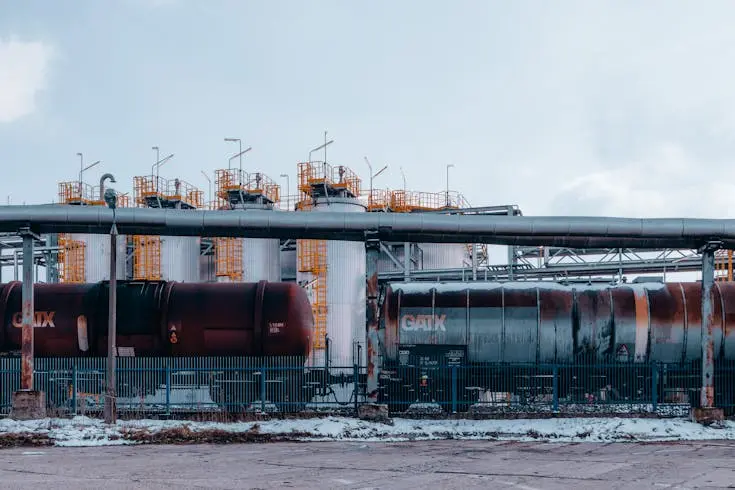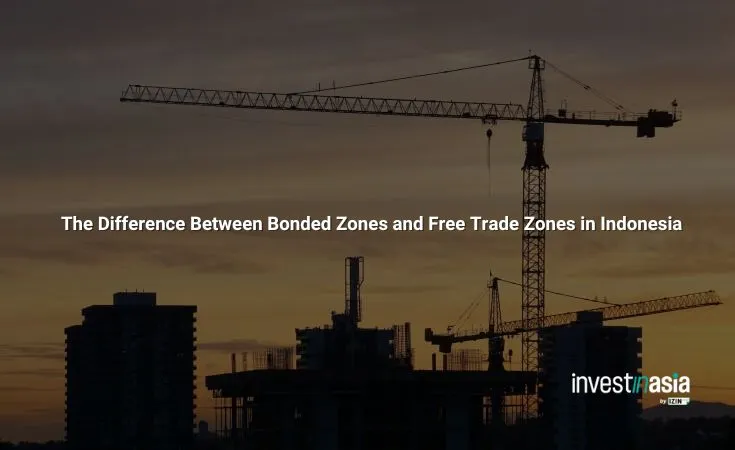When expanding your business into Indonesia, one of the first strategic decisions you’ll face is whether to operate in a bonded zone or a free trade zone (FTZ). Both are designed to attract investment and facilitate trade, yet they differ significantly in customs status, fiscal incentives, and operational flexibility.
At InvestinAsia, we often guide foreign investors through these distinctions to help them choose the most advantageous setup. Below is a clear, expert-led breakdown.
Key Distinctions Between Bonded Zones and Free Trade Zones in Indonesia


The table below shows a summary of the key differences between Bonded Zones and Free Trade Zones in Indonesia:
| Aspect | Bonded Zone (Kawasan Berikat) | Free Trade Zone (Kawasan Perdagangan Bebas dan Pelabuhan Bebas / KPBPB) |
|---|---|---|
| Legal Framework | Governed by Customs Law No. 10/1995, GR No. 28/2008, MoF Regulation No. 131/PMK.04/2018 | Governed by Law No. 36/2000 and GR No. 41/2021 |
| Customs Status | Inside Indonesian customs territory (under DJBC supervision) | Outside Indonesian customs territory (separate legal status) |
| Main Purpose | Export-oriented manufacturing and processing | Broad economic activities including trade, logistics, services, and tourism |
| Business Orientation | Primarily for export manufacturing; up to 50% domestic sales allowed | Oriented toward international trade and regional service industries |
| Tax Treatment | Import duties suspended (deferred); VAT and excise exempted | Import duties fully exempted; VAT, excise, and other taxes fully exempted |
| Supervisory Authority | Directorate General of Customs and Excise (DJBC) | Free Trade Zone Authority (e.g. BP Batam, BP Bintan) |
| Geographic Coverage | Widespread across Indonesia (e.g., Cikarang, Tangerang, Surabaya, Karawang) | Limited to four regions: Batam, Bintan, Karimun, and Sabang |
| Licensing Process | Through Indonesia National Single Window (INSW) and OSS system | Through respective Free Trade Zone Authorities (centralized per zone) |
| Eligible Businesses | Domestic (PMDN) and foreign (PMA) manufacturers | Domestic and foreign investors across multiple sectors |
| Allowed Activities | Manufacturing, assembly, warehousing, quality control, packaging | Manufacturing, trade, logistics, tourism, port operations, finance, technology |
| Fiscal Incentives | Duty and tax deferral; no full exemption | Full duty and tax exemption; potential income tax incentives |
| Market Access | Primarily export, limited domestic sales (≤50%) | Free regional and international trade access |
| Infrastructure Type | Industrial buildings, warehouses, customs systems | Ports, airports, industrial estates, commercial and residential zones |
| Economic Objective | Boost export competitiveness and manufacturing efficiency | Develop global trade hubs and regional economic integration |
Legal and Customs Distinction
Bonded zones (Kawasan Berikat) are still part of Indonesia’s customs territory, meaning all activities are under the supervision of the Directorate General of Customs and Excise (DJBC). Companies can import raw materials, machinery, and equipment with deferred import duties, benefiting from tax suspensions rather than full exemptions.
Free trade zones (Kawasan Perdagangan Bebas dan Pelabuhan Bebas or KPBPB), however, are legally outside Indonesia’s customs territory. Goods entering FTZs are not considered imports under customs law. This grants full exemptions from import duties, VAT, and excise taxes, a more liberal fiscal regime that supports international trade and logistics.
Geographic Coverage
Bonded zones can be found across Indonesia: Cikarang, Tangerang, Surabaya, Karawang, and other industrial regions. Over 1,300 bonded zones are currently in operation.
In contrast, free trade zones are limited to Batam, Bintan, Karimun, and Sabang, strategically located near Singapore and Malaysia to leverage cross-border trade routes.
Also read: Complete List of Bonded Zones in Indonesia: Key Industrial Clusters and Strategic Roles
Business Focus and Economic Role
Bonded zones primarily support export-oriented manufacturing and processing. They are ideal for businesses that import raw materials, assemble products, and then export the final goods. Up to 50% of production can enter the domestic Indonesian market with applicable duties.
Free trade zones, by comparison, serve as broader economic hubs. Beyond manufacturing, they include logistics, tourism, port operations, services, and financial sectors. These zones aim to position Indonesia as a regional trade gateway integrated with global supply chains.
Fiscal Incentives Comparison
Check the table to see the differences in fiscal incentives between the two:
| Aspect | Bonded Zones | Free Trade Zones |
|---|---|---|
| Customs Territory | Inside Indonesia | Outside Indonesia |
| Import Duty | Suspended (Deferred) | Fully Exempted |
| VAT & Luxury Tax | Exempted | Exempted |
| Excise Duty | Exempted | Exempted |
| Income Tax on Imports | Exempted (Article 22) | May receive partial or full exemption |
| Tax Holiday Availability | Limited | Available for qualified investors |
| Supervising Authority | Directorate General of Customs (DJBC) | Free Trade Zone Authority (e.g. BP Batam) |
The main takeaway: Bonded zones provide tax deferrals, while free trade zones offer total exemptions and broader sectoral flexibility.
Infrastructure and Licensing


Bonded zones are equipped with industrial and warehouse facilities, customs monitoring systems, and logistics support, making it ideal for manufacturers. Licensing is processed through the Indonesia National Single Window (INSW) integrated with the OSS system.
Free trade zones feature ports, airports, commercial complexes, and residential facilities under unified administration by BP Batam or other FTZ authorities. Licensing here is faster and often pre-approved for high-priority investments.
Also read: Why Foreign Founders Prefer Jakarta, Bali, and Batam for Their Business Ventures
Strategic Business Implications
If your business focuses on export manufacturing, bonded zones offer cost efficiency through tax deferral and simplified re-export procedures.
If your operations involve logistics, services, or regional trading, free trade zones provide the advantage of unrestricted trade, international connectivity, and a globally oriented environment.
Both zones contribute significantly to Indonesia’s economic ecosystem. Bonded zones strengthening manufacturing competitiveness, and free trade zones expanding trade and service integration.
At InvestinAsia, we’ve guided many international investors in determining the most strategic entry point, whether through bonded manufacturing clusters or dynamic free trade zones like Batam.
Learn more about InvestinAsia’s complete services:
- PMA registration in Indonesia (Foreign Company)
- Representative office registration in Indonesia
- Indonesia Local PT PMDN Set Up
- Indonesian Virtual office setup
- Business registration number in Indonesia
- Business Licenses in Indonesia
- Trademark Registration in Indonesia
- Franchise License in Indonesia
- Indonesia Visa and Stay Permits Application
- Indonesia Tax Consultant and Compliance
If you are interested in starting a business in Indonesia without hassle, you can start by contacting us for FREE consultation.
FAQs
Are bonded zones and free trade zones the same as Special Economic Zones (SEZs)?
No. SEZs (Kawasan Ekonomi Khusus) cover multiple sectors including tourism and technology, while bonded and free trade zones focus mainly on manufacturing and trade facilitation.
Can a foreign company own facilities in a bonded zone?
Yes. Both domestic and foreign investment (PMA) companies can operate in bonded zones with appropriate licensing.
Which is more suitable for logistics businesses?
Free trade zones, especially Batam, are better suited for logistics and transshipment due to their strategic maritime location and full customs exemption.
Are goods in free trade zones considered imported into Indonesia?
No. Goods within FTZs are legally outside the Indonesian customs area until formally imported into the domestic market.
Can bonded zone companies sell locally in Indonesia?
Yes, but only up to 50% of production, and those goods will be subject to import duties and taxes upon domestic release.



